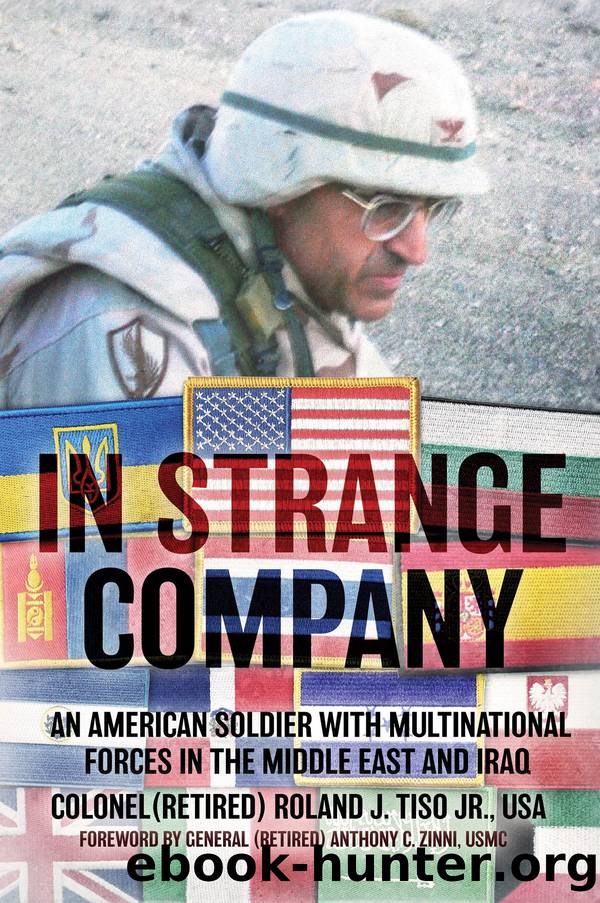In Strange Company by Roland J. Tiso Jr

Author:Roland J. Tiso Jr.
Language: eng
Format: epub
ISBN: 9781636243955
Publisher: Casemate Publishers
Published: 2023-04-15T00:00:00+00:00
Captain Owens, Captain Loman, Colonel Tiso, and Captain Reed.
With an El Salvador platoon following a patrol in Al-Najaf, December 2003, shortly after the announcement of Saddamâs capture.
Chapter 18
The Challenges of Multinational Command
Advisers have to be empathetic to their counterparts and understand their culture while being honest about the units and their leaders.
âLIEUTENANT COLONEL JAMES WILLBANKS, USA
The Polish and Ukrainian brigades had deployed to Iraq for the purpose of conducting peacekeeping and stability operations. They could conduct limited combat operations, but they were not nearly as robust or capable as American formations. They could shoot, move, communicate, and sustain themselves to a limited degree. The Ukrainians had their armored personnel carriers but neither brigade had artillery or any substantive indirect-fire assets. The Soviet-built Polish helicopters were sorely lacking anti-missile defenses. Armament on the large Mi-8s was limited to door guns. The United States had committed several units and assets to back up the Multinational Division (MND) including a battalion of military police, air medical-evacuation support, a communications company, and considerable transportation assets. It could all be summed up as the cost of diplomatic and political credibility that comes with waging Coalition warfare as well as an effort to facilitate operations and reinforce vulnerabilities. By the end of August, however, it was evident the American military had not done enough to facilitate the divisionâs operational effectiveness.
On 27 August, the MND staff received a report from Brigadier General Cardona, the commander of the Spanish brigade, that the Latin American battalions (El Salvador, Honduras, and the Dominican Republic) and the Nicaraguan detachment were non-mission capable and transition of authority (TOA) in Al-Najaf by 3 September was unlikely. The ramifications of this report prompted as much consternation and gnashing of teeth as a major enemy breakthrough of a critical defensive position. Efforts to address General Cardonaâs concerns were made immediately and several members of the division staff, under the leadership of Spanish Director of Operations Colonel Cabeza, flew to Al-Najaf on the 28th. I had planned to go as well, but was informed, when I arrived at the airstrip at the specified time, that the aircraft had already departed. The Polish G-3, Colonel Gozul, later told me Colonel Cabeza was not comfortable with having another member of the staff present for this mission. I had already sensed the proud Spaniard had grown uncomfortable with my relationship with the commanding general. I respected his decision to leave me behind, though I quietly resented being deceived. Putting myself in his position, however, I thought having a little âspaceâ to act independently of the command group or its senior adviser was a good thing. Someone had to get to the bottom of this problem and sort it out. Solving the TOA challenge would be a major coup for the director of operations and a tremendous boost to his credibility. Javier Cabeza wanted the credit; no one wanted him to have it more than I did. A good adviser seeks to promote confidence in the people with whom he serves.
Download
This site does not store any files on its server. We only index and link to content provided by other sites. Please contact the content providers to delete copyright contents if any and email us, we'll remove relevant links or contents immediately.
| Civil War | Operation Desert Storm |
| Veterans | Vietnam War |
The Radium Girls by Kate Moore(10915)
The Templars by Dan Jones(4192)
100 Deadly Skills by Clint Emerson(4085)
Rise and Kill First by Ronen Bergman(4019)
The Doomsday Machine by Daniel Ellsberg(3736)
The Rape of Nanking by Iris Chang(3526)
Killing England by Bill O'Reilly(3461)
Hitler in Los Angeles by Steven J. Ross(3446)
Stalin by Stephen Kotkin(3090)
12 Strong by Doug Stanton(3059)
Hitler's Monsters by Eric Kurlander(2737)
Darkest Hour by Anthony McCarten(2650)
Blood and Sand by Alex Von Tunzelmann(2611)
The Art of War Visualized by Jessica Hagy(2416)
Hitler's Flying Saucers: A Guide to German Flying Discs of the Second World War by Stevens Henry(2301)
The Code Book by Simon Singh(2217)
The Second World Wars by Victor Davis Hanson(2136)
Babylon's Ark by Lawrence Anthony(2073)
Tobruk by Peter Fitzsimons(2065)
